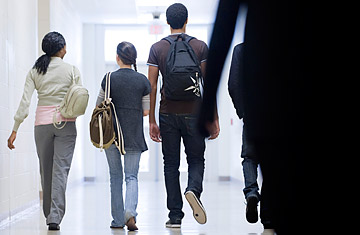
(4 of 6)
When Andres Alonso took over as chief executive officer of the Baltimore city public-school system five years ago, he made cutting the system's high suspension rates one of his first priorities. Alonso's desire was based partly on his own experience as a classroom teacher. "If I sent a child out of my classroom, I was sacrificing authority and communicating the classroom was not the place for the child," he says.
The district made several changes, including revising the code of conduct to eliminate suspension as an option for many first-time soft offenses, like talking back to a teacher. Alonso required principals to obtain permission from him or a designee if they wanted to suspend a child for more than five days in a single stretch. He established Success Academy, an alternative school for students on long-term suspensions or expulsions, inside the district's central office. The last move was designed partly to send the message that troubled students are at the center of the district's mission, not disposable.
The district also significantly increased its use of so-called student support teams, which convene at the school level to develop behavior plans tailored to individual children, and added to mental-health services in some schools. But Alonso left it up to individual principals to decide on specific approaches to cutting suspension rates inside their buildings.
That has proved easier for some schools than others.
At City Springs Elementary-Middle School, Alonso's push coincided with Principal Rhonda Richetta's decision to introduce a "restorative justice" approach to school discipline: instead of automatically suspending students when there is a problem, staff and students sit together in circles to talk through many thorny and contentious issues. Often, the end result is a punishment tailored to the specific crime.
When one eighth-grader was caught selling BB gun pellets, for instance, Richetta required him to come to school early and sell fruit snacks to younger students. Richetta wanted him to learn that he could earn money through legal means — although in this case, he was required to turn over all proceeds to the school.
Initially, Richetta received significant push-back from teachers. Eight left during the first year restorative justice was implemented, in part because they disliked the shift away from suspension.
"It was really hard for adults to change their behavior, particularly when they were used to the least little infraction resulting in suspension," Richetta says. "In the past, if a child said something disrespectful, that was a suspension. If a child got up and walked out of class, that was a suspension ... The problem is, it's really hard to educate kids when they are not here."
During the 2007–08 school year, City Springs issued about 50 suspensions, compared with 21 this school year as of April 6, even as enrollment has grown significantly. But Richetta considers the cultural shift inside the building — which she measures through the increased number of students smiling on their way to class in the morning — just as important. "I think people are giving up on our kids because of their behavior," she says. "They are not seeing that that behavior is really reaching out for help."
Baltimore's Reginald F. Lewis High School has also seen a sharp drop in suspensions, from well over 100 annually prior to 2010 to fewer than 20 so far this school year.
The school felt unsafe to students Markira Thomas and Jaquel Mullen when they started as freshmen in the fall of 2008. Earlier that year, a student had sucker punched and pounded an art teacher in her classroom. (The school's principal later alleged the teacher had actually provoked the fight.) Students smoked pot openly, ran through the halls and gambled with dice and cards in class. On her first day of school, Thomas begged her mother not to leave here there alone.
When Barney Wilson, one of the district's top principals, took the helm two years ago, he announced that the whole school would embrace what he called "Lewis love." It sounded corny to many of the teachers at first. But over time they discovered that the slew of small changes that constituted Lewis love — holding assemblies to recognize students who make positive contributions, creating peer-mediation programs, bringing parents in for conferences — transformed the school into a much happier place.
Essentially, it boiled down to better communication among students, parents and teachers, says Danielle Rembert, the assistant principal. "Some people are like, This is touchy-feely," she says. "But this is foundational. If we don't lay that foundation, none of the other stuff we try will work."
